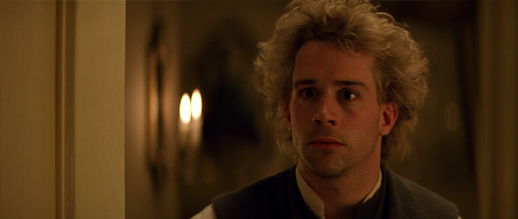

The tragic role is an obvious winner for Abraham, who plays a legendary screen figure filled with pride, envy, bitterness, self-loathing, God-hating and ultimate guilt.

“Why would God choose an obscene child to be His instrument?” Soon, Salieri comes to believe God is mocking him through the miraculous Mozart, and in an attempt to turn the tables on God Himself, hatches a scheme to get one last great work out of Mozart just before killing him. The dagger comes in 1781, when Mozart is invited to meet with the Emperor, an event for which Salieri slaves to prepare a “March of Welcome.” Upon hearing the tune, Mozart hops onto the piano and, within seconds, transforms Salieri’s piece into the “Non più andrai” march from his opera, The Marriage of Figaro - you know, the opera Andy Dufresne plays over the prison speakers in The Shawshank Redemption (1994).Īt this point, Salieri falls into a deep spiritual crisis, devastated by his own inferiority, his own blocked route to immortality and, most of all, what he sees to be an unjust distribution of God-given talent. Salieri’s confession becomes the film’s narrative, detailing in flashback his own rise as a musician, only to be overshadowed by the natural talent of Mozart (Tom Hulce), a musical prodigy the likes of which had never been seen.Īgainst expectation, the legendary figure is presented as immature, womanizing and ridiculous - all salt in the wound to a serious artist like Salieri. That rival is Antonio Salieri (Abraham), an accomplished Austrian composer who attempts suicide in the film’s opening scene, screaming, “Mozart! Forgive your assassin! I confess, I killed you!” This leaves viewers to ponder the guilt one would carry if responsible for killing a musical genius and robbing history of years of great music (i.e. Mark David Chapman, who killed John Lennon).Īt this point in his life, Salieri is sore that God has kept him alive to see his own work disappear into history, while that of Mozart lives on in fame. While his death was recorded as “severe miliary fever,” the film explores rumors that Mozart was poisoned, introducing the idea of a jealous rival possibly having killed the boy wonder. 73 on the WGA’s 101 Greatest Screenplays, one spot ahead of Charlie Kaufman’s Being John Malkovich (1999), Shaffer’s tale follows Mozart’s meteoric life, from enfante terrible to a young death at age 35.
#Amadeus 1984 movie#
Even the least of movie buffs know this, thanks to Last Action Hero (1993), where a young boy warns Arnold Schwarzenegger that Abraham can not be trusted: “He killed Mozart! … Amadeus ! It won eight Oscars!” Murray Abraham), Director (Forman) and Screenplay (Peter Shaffer from his own play). The film dominated the night with eight Oscars, including Best Actor (F. When it came time for Laurence Olivier to announce the Best Picture result, the acting legend shocked the Academy by skipping the nominees and immediately saying, “The winner is Amadeus.” Nothing more needed to be said. When one-hit-wonder Falco topped the pop charts with “Rock Me Amadeus” in 1985, it came just months after Milos Forman’s Amadeus won the Oscar for Best Picture. The film - and the song - were 20th century revivals of 18th-century genius, exploring the mind and work of Wolfgang Amadeus Mozart, perhaps the greatest musical influence in the history of Western culture.


Murray Abraham, Tom Hulce, Elizabeth Berridge, Simon Callow, Roy Dotrice, Christine Ebersole, Jeffrey Jones, Charles Kay, Kenny Baker Writer: Peter Shaffer (screenplay from his own play)Ĭast: F.


 0 kommentar(er)
0 kommentar(er)
